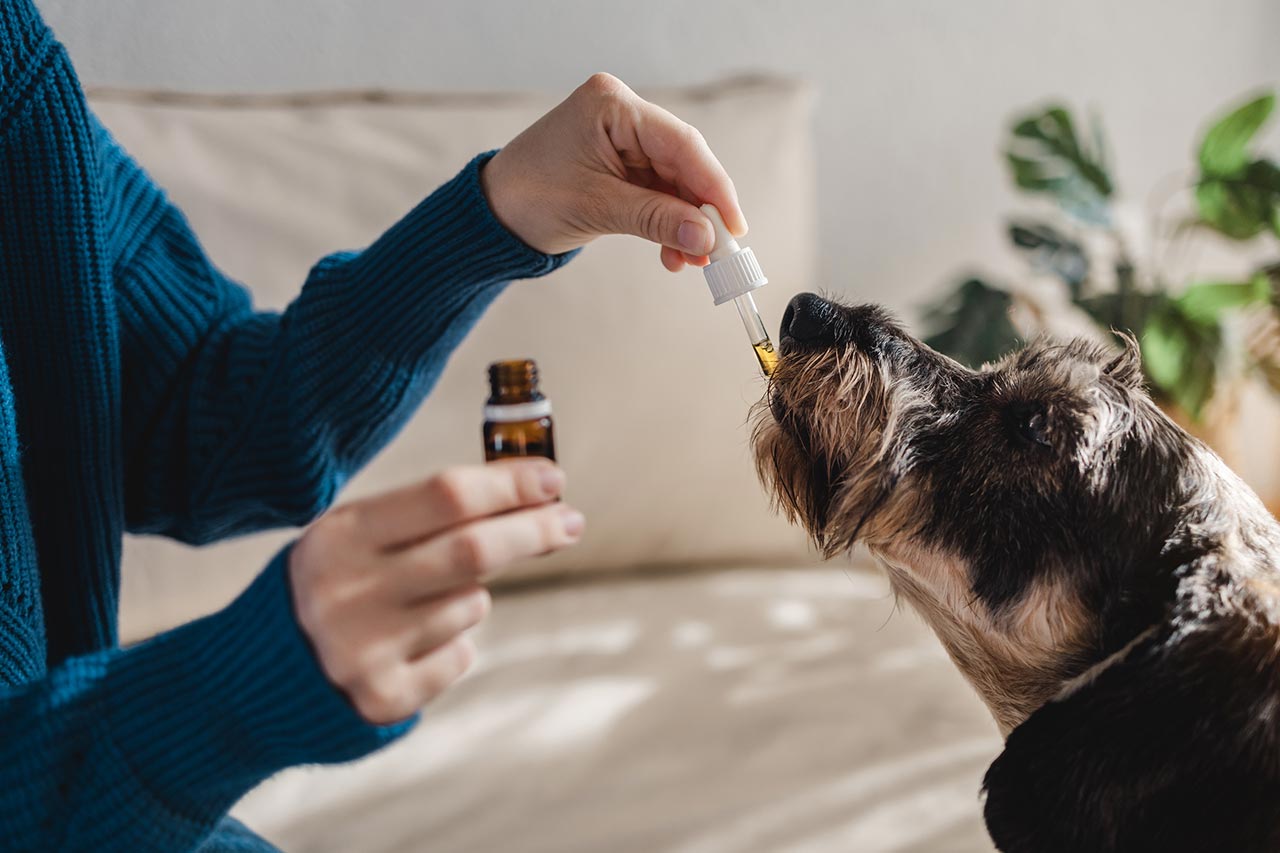Cannabidiol Use in Animals

Alcimed, an innovation and new business consulting firm, describes the trend in increasing Cannabidiol products for companion animals and discusses the current level of scientific evidence and the future of this market.
There has been a rush of cannabidiol-based products, a non-psychoactive compound found in marijuana and hemp, hitting the shelves in the last year. But exactly how much science is there to back up the health benefit claims for companion animals, or is Cannabidiol just a passing craze?
Companion animal trends follow human trends, so the rise of cannabidiol (CBD) companion animal products comes as no surprise following the signing of the 2018 farm bill allowing hemp to be grown in the US. This market quadrupled in sales from 2017 at $8M to $32M in 2018 and is estimated to grow to $1.16B in the US by 2022 according to the Brightfield Group. These CBD items can be bought in pet stores or online and range from CBD-infused treats, to oils, to capsules. They generally are marketed for full-spectrum use, including helping with IBD, chronic pain, epilepsy & seizures, Inflammatory Bowel Disease (IBD), arthritis and more in our furry companions. However, the majority of these uses stem from anecdotal evidence. The amount of evidence for the clinical benefits of CBD for cats & dogs is low and the strength of evidence is weak. Of the published studies, mostly in dogs so far, only a few show significant results for improvement of pain levels, quality of life, or for more specific claims such as reduction of seizures. In general, CBD has been proven safe for cats & dogs, and funding and interest into further studies is on the rise. However, the FDA currently has not approved any products or supplements infused with CBD for cats or dogs and cautions against giving CBD to pets. For pet food specifically, the FDA and AAFCO have stated that CBD as an ingredient is currently prohibited. “Despite the lack of solid proof, CBD is still a major trend in pet products, with one survey showing that 92% of veterinarians have been asked by their clients about CBD for their pets.” Jessica Canavan commented, a senior consultant at Alcimed.
CBD products have entered the livestock feed market as well but for different reasons. How does the level of evidence and confidence in CBD products’ effectiveness compare to that of companion animals?
At the same time, CBD products have entered the large-animal veterinary scene. There seems to be a small market for CBD products in large animals, but there are several hurdles that still must be overcome in order for the market to expand and become substantial. Right now, food pellets, oils, and more products infused with CBD are marketed for horses, cattle, swine, poultry, etc. These products claim to help lower anxiety and stress, make transportation easier, manage aches & pains, modify behavior, help with training/grooming, even improve fertility or boost feed intake, or simply serve as a daily overall health supplement for these animals. However, there is less anecdotal evidence compared to cats and dogs, and even fewer studies published. There is very limited evidence to support some of these claims. However, a Farm Journal special report found that the majority of livestock owners are very curious about hemp in livestock feed and would like to see more data become available. But of course, the market drivers for treating livestock animals differ greatly from the variables driving the CBD companion animal market. Demonstrating cost-effectiveness is the name of the game in livestock, as opposed to companion animals. However, just like in companion animals, the FDA and AAFCO have prohibited the use of CBD in livestock feed. CBD infused products are considered to be in the “drug” category and are not subject to the AAFCO review process. “Therefore, another market entry hurdle is the current regulatory uncertainty and potential additional costs to market,” said Danna Hargett, a project manager at Alcimed.
Now that you’ve heard about current CBD product use and trends in companion animals and in livestock, which is the better market to invest in?
Pet humanization is one of the main drivers for the use of CBD products in companion animals and will continue to grow as a global trend over the coming decade. Pet humanization refers to humans treating their pets as they would children, spending more disposable income on them to give the best care and products available. It is safe to say that the CBD companion animal market will continue to grow, regardless of when more solid studies become available to the public. On the other hand, the livestock CBD market is driven by cost-effectiveness, which may be difficult to demonstrate to get companies on board with the long-term financial investment needed to prove safety and efficacy, and analyze the food products derived for human consumption. In addition, the system of producing CBD by growing natural plants is currently not cost-effective. However, the passing of the farm bill legislation and general increase in acceptance may cause prices to drop in the near future. There is also research being done to find yeast strains capable of producing cannabinoids at a fraction of the cost of cultivating plants. Even so, this may or may not produce enough solid data to demonstrate cost-effectiveness of CBD for livestock applications. If sufficient data were gathered, it could then in turn spark interest in investing in scientific studies to demonstrate effectiveness.
Livestock supplements with CBD are a niche market and may not have the potential to grow as most livestock owners are more interested in hemp byproducts in general for livestock feed than CBD supplements. However, the CBD supplements market for companion animals is an investment worth considering for pet product manufacturers.
Do you have an exploration project?
Our explorers are ready to discuss it with you